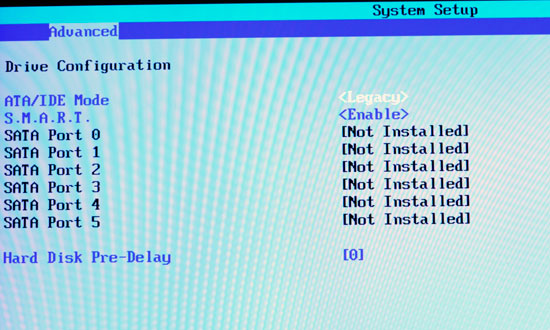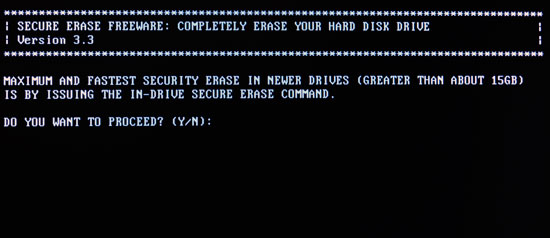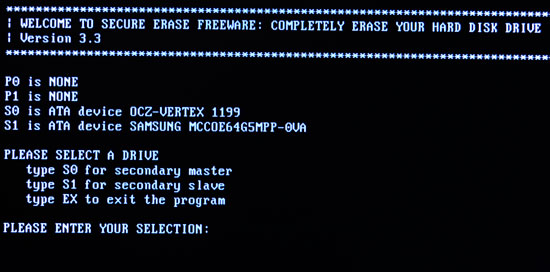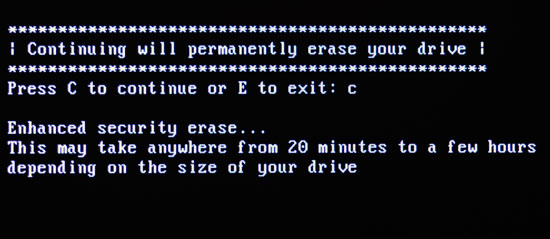The SSD Anthology: Understanding SSDs and New Drives from OCZ
by Anand Lal Shimpi on March 18, 2009 12:00 AM EST- Posted in
- Storage
Restoring Your Drive to Peak Performance
Based on my explanation there’s one sure-fire way to make your drive fast again. Formatting/deleting everything on the drive won’t work because those pages on the drive will remain full of data.
If you are doing a clean setup of your machine and want to restore your drive to its native state you’ll have to perform a secure erase. Intel distributed a tool with the first X25-M review kits called HDD ERASE. This tool will take any SSD and free every last page on the drive. Obviously you’ll lose all of your data but your drive will be super fast again!
In order for HDDERASE to work you need to have your SATA controller running in Legacy IDE mode, you can select this in your BIOS. Your drive will have to be connected to one of the first four SATA ports off of the controller.

Boot to a command prompt (I just use a bootable DOS image on my USB stick) and run the executable. Answer its questions carefully and with honor.



Tell it you would like to perform a secure erase (an extended one isn’t necessary) and when it asks you if you wish to view LBA 0 you can say no. Reboot your machine (don’t forget to set your SATA controller back to whatever mode you had it in before, e.g. RAID or AHCI), partition your drive and you’re back in business.
On a good SSD I don’t believe there’s a need to secure erase periodically, but whenever you format or re-image your drive, I’d recommend a secure erase since you’re killing all of your data anyway.










250 Comments
View All Comments
siberx - Thursday, March 19, 2009 - link
This is, very likely, the best article I have ever read, period. Online, in magazines, about any subject... this was an absolutely fantastic read. Suddenly, all smoke surrounding SSDs has cleared and the truth shines through in editorial brilliance. It's great to see that at least some computer news sites out there can still cut through the crap and get to the heart of the issue. My already high opinion of AnandTech has risen even further.Thank you for taking the immense time it must have taken to compile and assemble all this information - this article is now a must-read for *anybody* considering purchasing an SSD, and it's just about all the background you could need in one place.
In addition to all the extremely useful general SSD information contained within, the detailing of the issues with the JMicron controllers as well as OCZ's efforts to address the concerns to produce the best product possible (despite the reduced marketability to the uninformed) is reassuring and comforting in a world where tech companies seem more concerned with how much they can deceive their customers instead of producing quality products.
In short, the article is a win on all fronts, thank you greatly for posting it. When I purchase my first SSD (which I'm considering doing reasonably soon) this article, its information and suggestions, and OCZs actions to resolve the issues with its drives will definitely be at the forefront of my mind.
jkua - Thursday, March 19, 2009 - link
I have to say, I really appreciate the effort and throughness with which you have covered the state of the SSD market today. As an engineer and scientist, I applaud your methods in tracking down and reporting the major issues with SSDs. As a consumer, I really appreciate the timeliness of this article as I was just thinking of putting an SSD in a netbook for a robotics application where mechanical drives are not ideal.Cheers!
jkua - Thursday, March 19, 2009 - link
That said, one thing I would have like to have seen is some numbers on power consumption for these drives compared to average mechanical desktop and laptop drives.aamsel - Thursday, March 19, 2009 - link
Anyone have a link to the Intel HDD ERASE program that Anand referred to?HolyFire - Thursday, March 19, 2009 - link
http://www.ultimatebootcd.com/download.html">http://www.ultimatebootcd.com/download.html (includes HDD erase 3.1)http://cmrr.ucsd.edu/people/Hughes/SecureErase.sht...">http://cmrr.ucsd.edu/people/Hughes/SecureErase.sht... (version 4.0)
AnnonymousCoward - Thursday, March 19, 2009 - link
AWESOME ARTICLE.The huge difference in read/write flash performance looks a lot like this article: http://www.anandtech.com/memory/showdoc.aspx?i=257...">http://www.anandtech.com/memory/showdoc.aspx?i=257...
wind glider - Thursday, March 19, 2009 - link
Thanks for the orgasmic review.wicko - Wednesday, March 18, 2009 - link
Had a really good read here, thanks for the history and info, Anand. The only thing I don't understand is what the importance of random write is? What kind of task would benefit from high random write speeds (maybe copying many files at once)? I'm tempted to pick up a vertex drive but it depends on whether or not random write will be important for me. But the price... whoa, pretty damn expensive here in Canada.. http://www.ncix.com/products/index.php?sku=36023&a...">http://www.ncix.com/products/index.php?...X120G&am... - $625 for a 120GB!!! I kind of want 2, for RAID0, I have a lot of games installed (steam folder alone is 100GB lol). Might even have to raid 3 of em.. but not for $1800 lol.strikeback03 - Thursday, March 19, 2009 - link
As mentioned in the article, the OS in general makes lots of random writes. Send an IM, it writes to a log. Load a website, it caches some images.AnnonymousCoward - Thursday, March 19, 2009 - link
>I'm tempted to pick up a vertex drive but it depends on>whether or not random write will be important for me.
Keep in mind, its random write is twice as fast as mechanical HDs.
>But the price...
It's only $110USD/32GB.